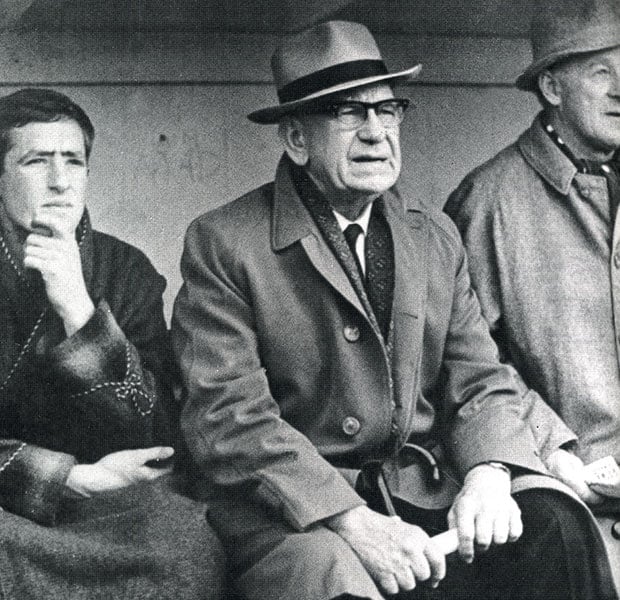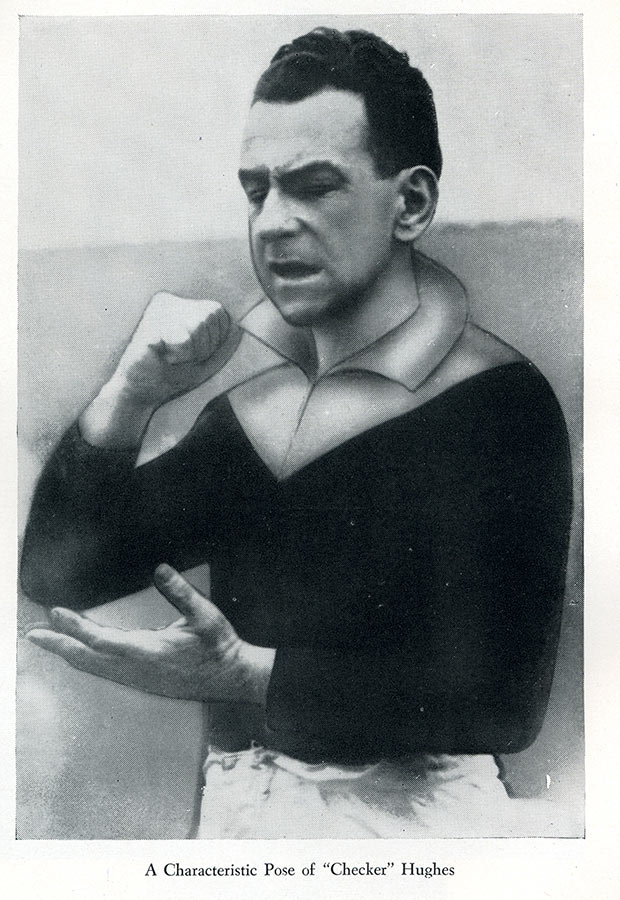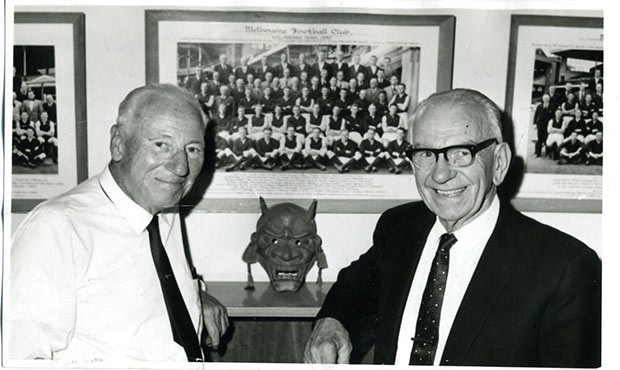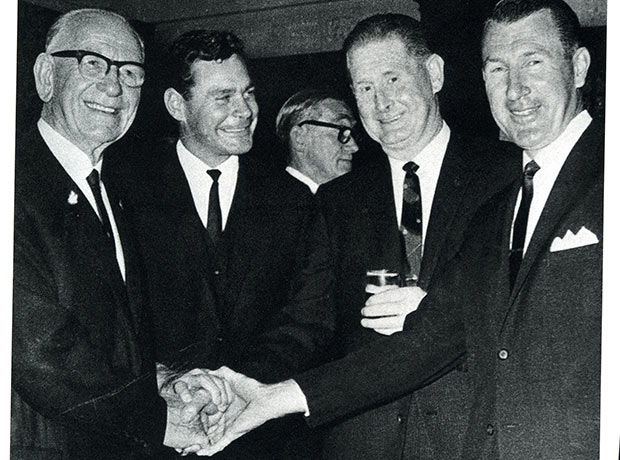• The Carlton and St Kilda players who debuted together and fell on the same day at Gallipoli
• Check out more great stories at the 2015 Anzac Day round hub
AT TIMES there's a perception AFL clubs play each other for so many cups, trophies and causes that they actually diminish what they set out to achieve.
Melbourne president Glen Bartlett has an idea for yet another tribute match, and it's difficult to mount an argument against it.
Bartlett is passionate about turning the Demons' Anzac round clash with Richmond at the MCG into an annual salute to Frank ‘Checker’ Hughes – a giant of both clubs.
You don't need Bartlett's keen sense of history to realise his proposal has great merit – and for more than just the obvious football reasons.
First, let's consider Hughes' remarkable footy CV.
A star midfielder for Richmond in three successive Grand Finals, including the 1920-21 triumphs, Hughes coached the Tigers into the finals in each of his six seasons, for five Grand Finals and one flag.
He then took Melbourne to September seven times, culminating in six Grand Finals for four premierships and the first draw (against Essendon).
'Checker' Hughes won three flags coaching or playing for the Tigers, and coached Melbourne to four. Picture: supplied
Hughes is one of just four coaches to win five premierships, and he did it after lifting both clubs out of the doldrums.
When Hughes was appointed at Richmond in 1927, the Tigers had been well out of finals contention in their previous two seasons. And Melbourne was further adrift when he took charge in 1933, having missed the finals for four years.
The charismatic Hughes instilled toughness and a culture of success at Melbourne, and even changed the club's nickname from Fuchsias to Demons.
Fuschias no more: Hughes changed the culture at the Demons. Picture: supplied
One of the great characters in the game's history, Hughes exuded a profound influence over League legends Norm Smith (his protégé, whom Hughes mentored for many years) and Jack Dyer – and countless others – with his psychological approach, tactical nous and brilliant oratory.
Hughes' place in League history is perhaps underrated, but it's assured.
Less is known about his war experiences.
Long before he became a football great, Hughes distinguished himself as a great serviceman. It's a good footy Anzac story, and he provided fascinating insights about both world wars, and how they entwined with football and footballers – sometimes with tragic consequences.
And how the army contributed to him playing for Richmond rather than Collingwood. A rare oversight for the powerful Pies of the era.
Francis Vane Hughes was born in February 1894 into a working-class family in Myrtleford, in Victoria's north-east.
The family soon moved to New South Wales, to The Rock and then to Sydney, before returning to Victoria and settling in Melbourne. For this final relocation, the Tigers and Demons – and indeed, Australian Football – owes Hughes' parents a debt of gratitude.
Young Frank showed great promise, becoming dux of Collingwood State School. However, his intelligence wasn't simply academic – he also became street-smart.
Football quickly became a focal point. Like most of his mates, Hughes dreamed of playing for Collingwood, and could easily have become a Magpie. A fascinating concept. The Tigers (in particular) and Demons have the army to thank.
As a teenager Hughes came to the attention of Richmond officials when he starred for local team Burnley as an undersized (172cm) centre half-back in a finals series at Punt Road Oval in 1913.
The Pies were also keen on Hughes, but seemed to lose interest when he was banished to Swan Island (near Queenscliff) for 20 days' detention after skipping compulsory military training with the citizens' forces (an precursor to the Army Reserve) to play football.
In 1953 he wrote in The Sporting Globe: "I was the naughty boy … I liked football better than drill."
While Hughes was in exile, Richmond remained in contact, giving him a guernsey and a new football. When Hughes regained his freedom, the Tigers swooped, signing him a day before Collingwood came knocking. The Pies were unimpressed – even more so on reflection.
By this stage the nickname Checker was already well established, coined by a mate's little sister. Whenever Hughes visited their house, the young girl would beckon him to lift her to see their checkered pigeons by saying: "Checker? Checker?"
Midway through the 1915 season, with ‘The Great War’ claiming increasing Australian casualties, Checker Hughes joined the cause.
He was a 21-year-old leather presser who lived with his wife Irene a few drop-kicks from Tigerland when he enlisted in Melbourne.
Hughes, right, coached Melbourne to 157 wins in 258 games. Picture: supplied
Hughes was originally rejected as unfit for service because he had bad teeth. He thought authorities too precious, later quipping: "Perhaps they expected us to bite our way through the Hindenburgh Line."
His service record noted his light brown hair, brown eyes and sallow complexion, and suggested he might well have already had a hard life, highlighting scars on his left leg, right shin and a finger on his right hand.
For the best part of four years Hughes served with the 57th battalion of the Australian Imperial Force, and displayed the kind of resourcefulness, ingenuity and compassion that would become trademarks in his coaching.
He rose through the ranks to the position of company quartermaster sergeant, responsible for his unit's supplies.
Hughes was exceptional in this role, with the Commonwealth of Australia Gazette stating: "(He) has always given to the Battalion his undivided efforts. He has shown great initiative in the care of his men and no matter what the conditions he had invariably personally seen that every man under his care has been properly fed and clothed. His efforts have without doubt assisted greatly towards the comfort and well being of the men of his Company. His energetic efforts to better the conditions of his men in adverse situations are worthy of the highest praise and his devotion to duty is worthy of acknowledgement."
Hughes' dedication was rewarded, as the London Gazette noted: "HIS MAJESTY THE KING has been graciously pleased to approve of the award of the Meritorious Service Medal … in recognition of valuable services rendered with the Armies in France and Flanders (Belgium)."
It was also in the snow in France that Hughes reacquainted himself with football.
They would spend a week fighting on the frontline, followed by a week in support and then a week in reserve, when they basically killed time.
Away from the battlefield, they would first get some blessed sleep, then take a rare, disinfectant bath before being handed "what passed for clean clothes".
"There is nothing so dangerous as a big bunch of Australian soldiers with nothing to do," Hughes later wrote. "The things they can think up! We decided to get stuck into footy."
It was a welcome distraction from the horrors of war but still proved a challenging environment for football, with Hughes declaring the Somme in 1916 "the coldest and wettest in history".
The first challenge was to set up a suitable playing field, as the area they occupied around the village of Mametz was pockmarked with big shell-holes. To remedy this, about 400 men, with the aid of various vehicles and machinery, filled in the craters to make a rough football ground. The field was soon covered by 15cm of snow.
Hughes: "Later the snow melted and we found it was a ploughed field from one of the nearby farms."
There were games between companies, battalions and brigades for the divisional championship.
Hughes played alongside his 15th Brigade commander, the legendary Harold ‘Pompey’ Elliott (nicknamed after Carlton great Fred ‘Pompey’ Elliott), along with some players of League experience.
Hughes' 57th Battalion team was also a good one but couldn't knock off the 60th Battalion, which comprised a number of players from Collingwood, Fitzroy and Richmond.
Hughes: "We were rigged out in Comforts Fund guernseys and looked the part. An Italian bootmaker cut our stops. The 15th Brigade took them and Pompey was on top of the world."
(The Comforts Fund was a national fundraising body formed by Australian women's groups to send various items to Aussie soldiers abroad.)
Hughes also enjoyed himself when awarded leave. The morning after a big night in London in 1917, he was charged by a military policeman for "failing to salute the King's colours" during a procession. It didn't help that the answered back the military policemen after being poked in the chest.
The result? His future leave applications were to go via the AIF's commanding officer.
Hughes revealed that just nine months later the same commander approved his promotion to company quartermaster sergeant.
Hughes soon tested the boundaries again when he was permitted four days leave in Paris.
"The temptation was too strong. I put a stroke in front of the four and made it 14 (days)," he wrote. He received the same punishment.
It wasn't all shenanigans, though. Hughes reflected with sadness on the loss of former Tigers teammate Bill Nolan, who started his League career with Hughes in 1914-15 and "got a bad one" in France in July 1916.
Hughes arrived back in Melbourne on May 12, 1919, and was back playing for Richmond within four weeks.
The centreman/rover had missed four prime years of football but made up for lost time by playing in three successive Grand Finals, being one of the Tigers' best in a losing side against Collingwood in 1919 before playing in back-to-back flags under fellow ex-servicemen Dan Minogue.
When World War II came around, Hughes was a football statesman.
He'd coached the Richmond seconds, Tasmanian club Ulverstone, and Richmond's seniors before joining Melbourne, which had guaranteed a job the Tigers couldn't provide during the Depression.
When war broke out in September 1939, Hughes was just weeks away from leading Melbourne to the first of three successive flags.
Some have suggested if not for war, the Demons might have won as many as six flags in a row.
Four Demon greats: (l-r): Hughes, Ron Barassi, Norm Smith, John Beckwith. Picture: supplied
Although Hughes didn't serve in World War II, he felt its reverberations from home.
He kept a pile of wartime letters in his desk drawer for his eyes only.
Hughes: "They can't be described. They fought like hell. They played the devil… Yet, out of it all came abiding friendship, the friendship that grows overnight when men are thrown shoulder to shoulder in a common calamity. We found strength. We showed our weaknesses…
"I've seen two world wars. Never want to see another."
Melbourne was the club most devastated by the war, which claimed 10 players Hughes had coached. Hughes loved them like sons.
He had particular affection for the most famous of these men, Keith ‘Bluey’ Truscott, the ace fighter-pilot who was awarded a Distinguished Flying Cross and Bar, before being killed in a flying accident during training off the coast of Western Australia in March 1943. Hughes lamented the death of a "skylarking kid" who usually had a "huge smile under that shock of red hair".
Just months after the Truscott tragedy, Hughes donated to the Demons the ‘Bluey’ Truscott Memorial Cup (now medal), awarded to the club's best and fairest player.
Melbourne also honours several other premiership players who sacrificed their lives for the country.
The runner-up award recognises Sid Anderson (whom Hughes was adamant would have become "one of the greatest wingmen the Australian game has produced"); the award for third honours Ron Barassi senior (who was killed at Tobruk "because he tried to do the other blokes a turn"), and the best first-year player award pays tribute to Harold Ball ("a champion player [and] a champion kid").
In August 1945 – with the Allies close to declaring victory – Hughes stirred the emotions of his players before a big game by invoking the spirit of the fallen Demons.
"This will possibly be the last game of football you will play during the war period," Hughes said. "During the war, many of you young players have been wearing the numbers of players who have made this club famous. Some of them made the supreme sacrifice. Those players were champions because they would never admit defeat. You are playing a team above you on the premiership list. You have the ability to win. Now get out there and win!"
And win they did.
Frank 'Checker' Hughes: a legend of two clubs
Born: February 26, 1894
Died: January 23, 1978
Recruited from: Burnley
As a player
Richmond 1914-15 and 1919-23: 87 games, 51 goals, 2 premierships
As a coach
Richmond (1927-32: 120 games, 87 wins, 31 losses, 2 draws, 1 premiership), Melbourne (1933-41, 1945-48 and 1965: 258 games, 157 wins, 99 losses, 2 draws, 4 premierships), Victoria (1949-53)
Other honours
Australian Football Hall of Fame inductee 1996



